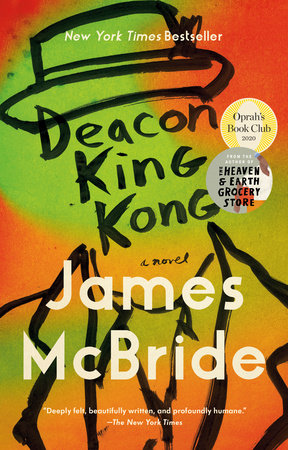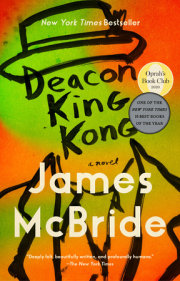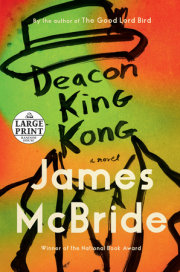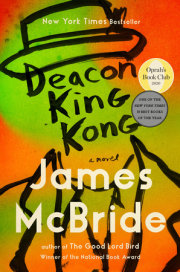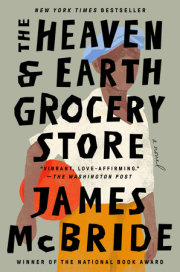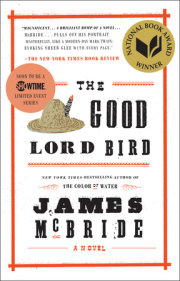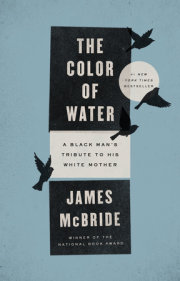1Jesus's CheeseDeacon Cuffy Lambkin of Five Ends Baptist Church became a walking dead man on a cloudy September afternoon in 1969. That's the day the old deacon, known as Sportcoat to his friends, marched out to the plaza of the Causeway Housing Projects in South Brooklyn, stuck an ancient .38 Colt in the face of a nineteen-year-old drug dealer named Deems Clemens, and pulled the trigger.
There were a lot of theories floating around the projects as to why old Sportcoat-a wiry, laughing, brown-skinned man who had coughed, wheezed, hacked, guffawed, and drank his way through the Cause Houses for a good part of his seventy-one years-shot the most ruthless drug dealer the projects had ever seen. He had no enemies. He had coached the projects baseball team for fourteen years. His late wife, Hettie, had been the Christmas Club treasurer of his church. He was a peaceful man beloved by all. So what happened?
The morning after the shooting, the daily gathering of retired city workers, flophouse bums, bored housewives, and ex-convicts who congregated in the middle of the projects at the park bench near the flagpole to sip free coffee and salute Old Glory as it was raised to the sky had all kinds of theories about why old Sportcoat did it.
"Sportcoat had rheumatic fever," declared Sister Clarence Gee, the president of the Cause Houses Tenant Association and wife of the minister at Five Ends Baptist Church, where Sportcoat had served for fifteen years. She told the gathering that Sportcoat was planning to preach his first-ever sermon that upcoming Friends and Family Day at Five Ends Baptist, titled "Don't Eat the Dressing Without Confessing." She also threw in that the church's Christmas Club money was missing, "but if Sportcoat took it, it was on account of that fever," she noted.
Sister T. J. Billings, known affectionately as "Bum-Bum," head usher at Five Ends, whose ex-husband was the only soul in that church's storied history to leave his wife for a man and live to tell about it (he moved to Alaska), had her own theory. She said Sportcoat shot Deems because the mysterious ants had returned to Building 9. "Sportcoat," she said grimly, "is under an evil spell. There's a mojo about."
Miss Izi Cordero, vice president of the Puerto Rican Statehood Society of the Cause Houses, who had actually been standing just thirty feet away when Sportcoat pointed his ancient peashooter at Deems's skull and cut loose, said the whole ruckus started because Sportcoat was blackmailed by a certain "evil Spanish gangster," and she knew exactly who that gangster was and planned to tell the cops all about him. Of course everybody knew she was talking about her Dominican ex-husband, Joaquin, who was the only honest numbers runner in the projects, and that she and her Joaquin hated each other's guts and each had worked to get the other arrested for the last twenty years. So there was that.
Hot Sausage, the Cause Houses janitor and Sportcoat's best friend, who raised the flag each morning and doled out free coffee care of the Cause Houses Senior Center, told the gathering that Sportcoat shot Deems on account of the annual baseball game between the Cause Houses and their rival, the Watch Houses, being canceled two years before. "Sportcoat," he said proudly, "is the only umpire both teams allowed."
But it was Dominic Lefleur, the Haitian Cooking Sensation, who lived in Sportcoat's building, who best summed up everybody's feelings. Dominic had just returned from a nine-day visit to see his mother in Port-au-Prince, where he contracted and then passed around the usual strange Third World virus that floored half his building, sending residents crapping and puking and avoiding him for days-though the virus never seemed to affect him. Dominic saw the whole stupid travesty through his bathroom window as he was shaving. He walked into his kitchen, sat down to eat lunch with his teenage daughter, who was quaking with a temperature of 103, and said, "I always knew old Sportcoat would do one great thing in life."
The fact is, no one in the projects really knew why Sportcoat shot Deems-not even Sportcoat himself. The old deacon could no more explain why he shot Deems than he could explain why the moon looked like it was made of cheese, or why fruit flies come and go, or how the city dyed the waters of the nearby Causeway Harbor green every Saint Paddy's Day. The night before, he'd dreamed of his wife, Hettie, who had vanished during the great snowstorm of 1967. Sportcoat loved to tell that story to his friends.
"It was a beautiful day," he said. "The snow came down like ashes from the sky. It was just a big, white blanket. The projects was so peaceful and clean. Me and Hettie ate some crabs that night, then stood by the window and watched the Statue of Liberty in the harbor. Then we went to sleep.
"In the middle of the night, she shook me woke. I opened my eyes and seen a light floating 'round the room. It was like a little candlelight. 'Round and 'round it went, then out the door. Hettie said, 'That's God's light. I got to fetch some moonflowers out the harbor.' She put on her coat and followed it outside."
When asked why he didn't go to the nearby Causeway Harbor after her, Sportcoat was incredulous. "She was following God's light," he said. "Plus, the Elephant was out there."
He had a point. Tommy Elefante, the Elephant, was a heavyset, brooding Italian who favored ill-fitting suits and ran his construction and trucking businesses out of an old railroad boxcar at the harbor pier two blocks from the Cause Houses and just a block from Sportcoat's church. The Elephant and his silent, grim Italians, who worked in the dead of night hauling God knows what in and out of that boxcar, were a mystery. They scared the shit out of everybody. Not even Deems, evil as he was, fooled with them.
So Sportcoat waited till the next morning to look for Hettie. It was Sunday. He rose early. The project residents were still asleep and the freshly fallen snow was largely untouched. He followed her tracks to the pier, where they ended at the water's edge. Sportcoat stared out over the water and saw a raven flying high overhead. "It was beautiful," he told his friends. "It circled a few times, then flew high up and was gone." He watched the bird till it was out of sight, then trudged back through the snow to the tiny cinder-block structure that was Five Ends Baptist Church, whose small congregation was gathering for its eight a.m. service. He walked in just as Rev. Gee, standing at his pulpit in front of the church's sole source of heat, an old woodstove, was reading off the Sick and Shut-in Prayer List.
Sportcoat took a seat in a pew amid a few sleepy worshippers, picked up a tiny one-sheet church program, and scrawled in a shaky hand, "Hettie," then handed it to the usher, Sister Gee, who was dressed in white. She walked it up to her husband and handed it to him just as Pastor Gee began reading the list out loud. The list was always long, and it usually bore the same names anyway: this one sick in Dallas, that one dying out in Queens someplace, and of course Sister Paul, an original founder of Five Ends. She was 106, and had been living in an old folks' home way out in Bensonhurst so long that only two people in the congregation actually remembered her. In fact there was some question as to whether Sister Paul was still alive, and there was some general noise in the congregation that maybe somebody-like the pastor-ought to ride out there and check. "I would go," Pastor Gee said, "but I like my teeth." Everybody knew the white folks in Bensonhurst weren't fond of the Negro. Besides, the pastor noted cheerfully, Sister Paul's tithes of $4.13 came by mail faithfully every month, and that was a good sign.
Standing at his pulpit mumbling down the Sick and Shut-in Prayer List, Pastor Gee received the paper bearing Hettie's name without a blink. When he read out her name he smiled and quipped, "Git in your soul, brother. A working wife is good for life!" It was a funny dig at Sportcoat, who hadn't held a steady job in years, while Hettie raised their only child and still worked a job. Rev. Gee was a handsome, good-natured man who liked a joke, though at the time he was fresh off scandal himself, having recently been spotted over at Silky's Bar on Marl Street trying to convert a female subway conductor with boobs the size of Milwaukee. He was on thin ice with the congregation because of it, so when no one laughed, his face grew stern and he read Hettie's name aloud, then sang "Somebody's Calling My Name." The congregation joined in and they all sang and prayed and Sportcoat felt better. So did Rev. Gee.
That night Hettie still didn't come home. Two days later, the Elephant's men discovered Hettie floating near the shore at the pier, her face gently draped with a scarf she'd worn around her neck when she left the apartment. They pulled her out of the bay, wrapped her in a wool blanket, laid her gently on a large tuft of clean white snow near the boxcar, then sent for Sportcoat. When he got there, they handed him a fifth of scotch without a word, called the cops, and then vanished. The Elephant wanted no confusion. Hettie was not one of his. Sportcoat understood.
Hettie's funeral was the usual death extravaganza at Five Ends Baptist. Pastor Gee was an hour late to the service because gout had swollen his feet so badly he couldn't get his church shoes on. The funeral director, old white-haired Morris Hurly, whom everybody called Hurly Girly behind his back because, well . . . everybody knew Morris was . . . well, he was cheap and talented and always two hours late with the body, but everybody knew Hettie would look like a million bucks, which she did. The delay gave Pastor Gee a chance to preside over a hank between the ushers about the flower arrangements. No one knew where to put them. Hettie had been the one who always figured out where the flowers went, placing the geraniums in this corner, and the roses near this pew, and the azaleas by the stained glass window to comfort this or that family. But today Hettie was the guest of honor, which meant the flowers were scattered helter-skelter, just where the deliverymen dropped them, so it took Sister Gee, stepping in as usual, to figure that out. Meanwhile Sister Bibb, the voluptuous church organist, who at fifty-five years old was thick bodied, smooth and brown as a chocolate candy bar, arrived in terrible shape. She was coming off her once-a-year sin jamboree, an all-night, two-fisted, booze-guzzling, swig-faced affair of delicious tongue-in-groove-licking and love-smacking with her sometimes boyfriend, Hot Sausage, until Sausage withdrew from the festivities for lack of endurance. "Sister Bibb," he once complained to Sportcoat, "is a grinder, and I don't mean organ." She arrived with a pounding headache and a sore shoulder from some kind of tugging from last night's howling bliss. She sat at her organ in a stupor, her head resting on the keys, as the congregation wandered in. After a few minutes she left the sanctuary and headed for the basement ladies' room, hoping it was empty. But she stumbled down the stairs on the way and twisted her ankle badly. She suffered the injury without blasphemy or complaint, vomited last night's revelry into the toilet of the empty bathroom, refreshed her lipstick and checked her hair, then returned to the sanctuary, where she played the whole service with her ankle swollen to the size of a cantaloupe. She limped back to her apartment afterward, furious and repentant, spitting venom at Hot Sausage, who had gotten his breath back from the previous night's tumble and now wanted more. He followed her home like a puppy, lingering half a block behind her, crouching behind the mulberry bushes that lined the projects' walkways. Every time Sister Bibb looked over her shoulder and saw Hot Sausage's porkpie hat protruding over the bushes, she flew into a rage.
"Git gone, varmint," she snapped. "I'm done merryin' with you!"
Sportcoat, however, arrived at the church in great shape, having spent the previous night celebrating Hettie's life with his buddy Rufus Harley, who was from his hometown and was his second-best friend in Brooklyn after Hot Sausage. Rufus was janitor at the nearby Watch Houses just a few blocks off, and while he and Hot Sausage didn't get along-Rufus was from South Carolina, while Sausage hailed from Alabama-Rufus made a special blend of white lightning known as King Kong that everyone, even Hot Sausage, enjoyed.
Sportcoat didn't like the name of Rufus's specialty and over the years had proposed several names for it. "You could sell this stuff like hoecakes if it weren't named after a gorilla," he said once. "Why not call it Nellie's Nightcap, or Gideon's Sauce?" But Rufus always scoffed at the notions. "I used to call it Sonny Liston," he said, referring to the feared Negro heavyweight champ whose hammer-like fists knocked opponents out cold, "till Muhammad Ali come along." Sportcoat had to agree that by whatever name, Rufus's white lightning was the best in Brooklyn.
The night had been long and merry with talk of their hometown of Possum Point, and the next morning Sportcoat was in fine shape, seated in the first pew of Five Ends Baptist, smiling as the ladies in white fussed over him and the two best singers in the choir got into a fight over the church's sole microphone. Church fights are normally hushed, hissy affairs, full of quiet backstabbing, intrigue, and whispered gossip about bad rice and beans. But this spat was public, the best kind. The two choir members involved, Nanette and Sweet Corn, known as the Cousins, were both thirty-three, beautiful, and wonderful singers. They had been raised as sisters, still lived together, and had recently had a terrible spat about a worthless young man from the projects named Pudding. The results were fantastic. The two took their rage at each other out on the music, each trying to outdo the other, hollering with glorious savagery about the coming redemption of our mighty King and Savior, Jesus the Christ of Nazareth.
Reverend Gee, inspired by the sight of the Cousins' lovely breasts swelling beneath their robes as they roared, followed with a thunderous eulogy to make up for his joke about Hettie when she was already dead in the harbor, which made the whole thing the best home-going service Five Ends Baptist had seen in years.
Copyright © 2020 by James McBride. All rights reserved. No part of this excerpt may be reproduced or reprinted without permission in writing from the publisher.

